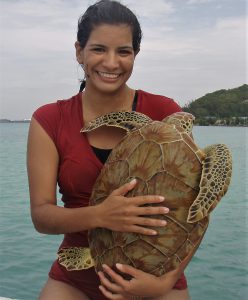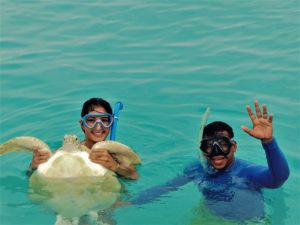
To help promote worldwide sea turtle conservation, every year since 1996 the Bermuda Turtle Project has offered an international course on the biology and conservation of sea turtles. The two-week course consists of extensive in-water field work capturing immature green turtles and hawksbills, lectures, class discussions of assigned readings, and a necropsy session. Participants are from Bermuda and other nations where the sea turtles that use Bermuda waters are likely to spend time during their long and complex live cycles. The course is given in conjunction with a two-week sampling session in Bermuda. Participants contribute to the project while learning the fundamentals of sea turtle biology from hands-on experience and a set of carefully selected readings. The course is designed around the life history of sea turtles.
Because we work mostly with green turtles in the field portion of the course, there is an emphasis on this species in the readings. However, we try to include discussions of all species at all life history stages. For most topics, we have included a specific case study from the primary literature rather than a review paper. We do this to introduce basic concepts in sea turtle biology, promote discussion of the reading material among students, and expose them to the types of research in which they might become involved.

Over the twenty-seven years during which the International Course on the Biology and Conservation of Sea Turtles has been offered, it has served over 250 students from the Wider Caribbean and North Atlantic. Participants have been drawn from Anguilla, Antigua, Argentina, Aruba, Belgium, Belize, Bermuda, Bonaire, Brazil, the British Virgin Islands, Canada, the Cayman Islands, Colombia, Costa Rica, Cuba, Grenada, Guatemala, India, Jamaica, Mexico, the Netherlands, Nicaragua, Panama, Peru, Portugal, St. Kitts/Nevis, Saint Lucia, Saint Maarten, Saint Vincent, Spain, Trinidad and Tobago, the Turks and Caicos Islands, the United Kingdom, the United States, Uruguay, and Venezuela.

The course is sponsored by the Bermuda Zoological Society and the Sea Turtle Conservancy and is provided free-of-charge. Funding for the project and participants comes from the Bermuda Zoological Society, the Sea Turtle Conservancy, the Atlantic Conservation Partnership and Chevron Texaco International.
Enrollment is limited to 10 students, ages 18 years and older.
Applications are accepted from all over the world, but priority will be given to candidates from regions connected to the Bermuda sea turtle population, or to those who are in the best position to implement the methods learned during the course.
Information Flyer and Course Application Form:
August 9-21, 2026
BTP 2026 Course Application Form